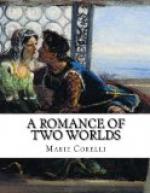“I was,” I answered, “till my state of health stopped me from working.”
Heliobas bent his eyes upon me in friendly sympathy.
“You were, and you will be again, an improvisatrice” he went on. “Do you not find it difficult to make your audiences understand your aims?”
I smiled as the remembrance of some of my experiences in public came to my mind.
“Yes,” I said, half laughing. “In England, at least, people do not know what is meant by improvising. They think it is to take a little theme and compose variations on it—the mere ABC of the art. But to sit down to the piano and plan a whole sonata or symphony in your head, and play it while planning it, is a thing they do not and will not understand. They come to hear, and they wonder and go away, and the critics declare it to be clap-trap.”
“Exactly!” replied Heliobas. “But you are to be congratulated on having attained this verdict. Everything that people cannot quite understand is called clap-trap in England; as for instance the matchless violin-playing of Sarasate; the tempestuous splendor of Rubinstein; the wailing throb of passion in Hollmann’s violoncello— this is, according to the London press, clap-trap; while the coldly correct performances of Joachim and the ‘icily-null’ renderings of Charles Halle are voted ‘magnificent’ and ‘full of colour.’ But to return to yourself. Will you play to me?”
“I have not touched the instrument for two months,” I said; “I am afraid I am out of practice.”
“Then you shall not exert yourself to-day,” returned Heliobas kindly. “But I believe I can help you with your improvisations. You compose the music as you play, you tell me. Well, have you any idea how the melodies or the harmonies form themselves in your brain?”




